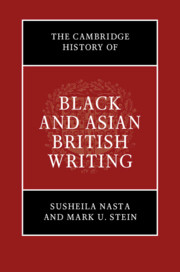Book contents
- The Cambridge History of Black and Asian British Writing
- The Cambridge History of Black and Asian British Writing
- Copyright page
- Dedication
- Contents
- Notes on Contributors
- Preface and Acknowledgements
- Introduction
- Part I New Formations
- 1 Narratives of Resistance in the Literary Archives of Slavery
- 2 Writer-Travellers and Fugitives
- 3 Exoticisations of the Self
- 4 Black People of Letters
- 5 Engaging the Public
- Part II Uneven Histories
- Part III Writing the Contemporary
- Select Bibliography
- Index
5 - Engaging the Public
Photo- and Print-Journalism
from Part I - New Formations
Published online by Cambridge University Press: 19 December 2019
- The Cambridge History of Black and Asian British Writing
- The Cambridge History of Black and Asian British Writing
- Copyright page
- Dedication
- Contents
- Notes on Contributors
- Preface and Acknowledgements
- Introduction
- Part I New Formations
- 1 Narratives of Resistance in the Literary Archives of Slavery
- 2 Writer-Travellers and Fugitives
- 3 Exoticisations of the Self
- 4 Black People of Letters
- 5 Engaging the Public
- Part II Uneven Histories
- Part III Writing the Contemporary
- Select Bibliography
- Index
Summary
This chapter examines how black and Asian writers established themselves as active participants in wider print culture in the early twentieth century. As the heart of empire, Britain was home to a range of intellectuals, writers, and journalists who expressed their often diverse and sometimes subversive political perspectives through various outlets, including periodicals such as The Islamic Review. This analysis explores the modes and means by which the Egyptian-British Duse Mohamed Ali, founding editor of the African Times and Orient Review, made inroads into fulfilling his ambition to shift thinking on issues of race and representation through the impact of print culture. The chapter also discusses the Indian Olive Christian Malvery’s photo-journalistic piece The Soul Market (1907), a narrative which provides interesting reflections and representations of the underclasses in London’s East End. Partially echoing what was already a familiar discourse on early twentieth-century reform, Malvery’s work, like Ali’s, reveals the complexity of her cultural and political affiliations and exposes the contradictions underlying her seemingly uncomplicated Anglophile voice and persona.
- Type
- Chapter
- Information
- The Cambridge History of Black and Asian British Writing , pp. 83 - 94Publisher: Cambridge University PressPrint publication year: 2020

